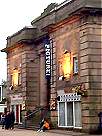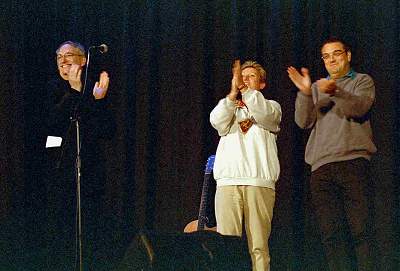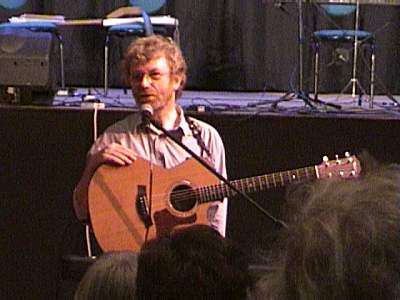New hope from the Star of Tomorrow
| | 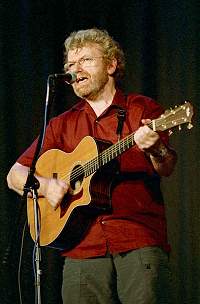  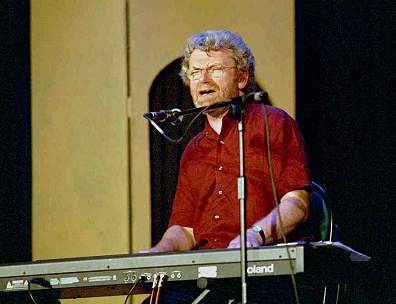 
|
Funny how you find the future amid the old… Leaving the labyrinth of the circum-Manchester motorways at last and striking out over the hills and vales of West Yorkshire - steeping in an unseasonably late September sun - I was struck by the dusky limestone of the still-standing mill chimneys, the small, huddled house terraces, the rearing faces of surrounding hills that got more forbidding as I approached the small West Yorkshire town of Hebden Bridge. Around me the legacy of Isambard Kingdom Brunel and other great captains of Victorian industry remained; remnants of an industrial might that had once ruled a planet and which were now frozen much as they must have left it. There is a standing time warp at Hebden Bridge - much as there is a standing time warp in the collective heart of the Midnight Voices. For some us the seventies never died - never really dissolved into that sorry mishmash of oil shortages and industrial action; never became the interval that the media now tell us is the decade that time forgot. Something deep inside me had been hoping that he might mention it: perhaps even play a song at some point in the set to acknowledge that it had happened, to express, however briefly, something of what we all have lost; most immediately those wonderful, precious, wasted lives. And also, perhaps, to acknowledge a truth simultaneously more trivial and yet more fundamental: the loss of our innocence and our sense of security. For many among the Midnight Voices it is the music of Pete Atkin and the words of Clive James that have articulated our fears and doubts, hopes and uncertainties over the past thirty years. For many of us in this hour of grief what could we do but hope that they might again supply the words and music to say the unsayable? Pete did not let us down. "Of course it must go ahead" he said, "as Clive himself would say, 'it's an hour of life inside a world of dying'." He is right of course. For life truly must go on. The only way that we can make some sense of the tragedy that has befallen us is to live life to the fullest even while we mourn the 6,000 missing - now certainly dead - under the billion tons of rubble that was the World Trade Centre. For his first number Pete reminded us of a particular resonance that was appropriate and as the first chords sang sweetly from his new guitar it was clear that he was more than on top of the situation. It was Sunlight Gate, Clive James' ode to another terrible time when bomber crews had been borne aloft to a destruction equally as certain as that which befell the firemen of New York on 11 September 2001. Pete's new guitar had a sound quite different from what we have come to expect from the Gibson. It takes some getting used to; its sound is very 'light', almost metallic, compared to its predecessor. Mindful, Pete said he was, to the present location and immediately segued straight into Screen Freak: "You've gotta help me Doc, I see things in the night..." From there he went straight to an old favourite from the first album "Beware of the beautiful stranger", it was Sunrise. He was aware that he was speaking to an audience that was not solely composed of die-hard fans like us and addressed his remarks to a wider audience drawn from the local community of Hebden Bridge. He said then, as he has said before, that Clive James' lyrics are built around a set of recurring themes and most of them are fairly depressing. They often reflect, said Pete, the importance of conscience in our everyday actions (clearly another aside referring to the recent tragedy in New York) but he said "sometimes conscience can say the wrong thing". The song was Shadow and the Widower, a rock-style number and this night the percussive waves of sound bounced right off the back of the theatre down to the front where we were sitting. These days Pete Atkin's voice is clear, strong and assured and nowhere was this more apparent than in this number. Then he moved to the keyboard - and telling us that he had had two requests for this number, and that it was one of the more complex pieces in the repertoire with its dual references to disparate pieces of history - moved straight into Canoe. Then, staying at the keyboard he introduced us to another new song, "that was a love affair with a ship but seen from a different angle", Dreamboat, and then it was Lady of a Day. "When I was in Cambridge" said Pete "I used to experiment a lot of with different instruments. The first of these was a saxophone I picked up in a second-hand junk shop. It was not a very good saxophone, but then I was not a very good saxophone player. But this next song is a song that comes out of those days; my days of struggling to master the saxophone. It was a memorable period in my life," said he "and probably for the people who had rooms around me." Laughter from the audience was followed by a choppy number played with authority and a distinctive honky-tonk sound: Cold Bitches. "There is a significant number of the audience who are more familiar with most of the songs in the repertoire than I am, and when they face you with that then that is a pretty heavy duty thing to have come at you." Then thoughtfully, "So this is one that I have not played much recently. It was Nothing left to Say. From there Pete moved back to the guitar and straight into a worthy old favourite, Girl on a Train. Still on guitar it was Care Charmer Sleep. Then "On these connoisseur occasions one of the things that I often try to do is to play a solo I normally do on the guitar on the keyboard, or the other way around. I think somebody asked for this one." It was I See the Joker. For me, one of my favourites, it was masterful. There is something about the 'Joker' song that, while it may seem technically more proficient on the keyboard, it is the guitar that really projects the anger, paranoia, and hopelessness of the narrator. I have never seen Pete do this number on the guitar but I have tried it millions of times myself with varying, if inadequate, degrees of proficiency. The next song "is dedicated to the inestimable Andy Love…" also a rocky number it was Wristwatch for a Drummer. Pete moved back to the keyboard to do a "…simple song, sometimes these are harder to do than the complex numbers, even something is clever as 'Wristwatch'..." It was a new addition to the repertoire; I Feel like Midnight. Then a new, 'old' number, A Man who's Been Around. "It was," said Pete "Another nakedly commercial attempt to be successful which also failed as had so many of our previous numbers. But at least we had the satisfaction of knowing that it was written as an antidote to Sinatra's 'My Way'." Then, "I've had threats made against me if I don't do this one." It was, of course, Beware of the Beautiful Stranger. Then it was almost the end of the evening but for one primed member of the audience who shouted a 'late-breaking request' for a song that almost nobody in the audience had ever heard of, Star of Tomorrow. Time was fast running out but Pete obliged, telling us that this was an unrecorded song that was written for him by Clive at a time when the lyric-meister would, after delivering his 'Observer' column on a Friday afternoon return to Cambridge for the weekend. It was, said Pete, a song whose resonances were so accurate that he had been sorely tempted to record it simply so that he could use the title for one of the two new discs. But, "Not only is this not on any CD, it is a song I'd forgotten we'd written." This lead-in was poignancy itself and the song, Star of Tomorrow, a moving, self-effacing ode to a career that never happened when Pete and Clive had wanted it to. We can but hope that one-day it will make it onto a new Pete Atkin CD. The encore was History and Geography. The night was wonderful, an early autumn night in a beautiful part of the world that even in the shadow of recent tragedy reminded us that there is so much to look forward to and to live for. For those of us in whose lives the music of Pete Atkin and Clive James plays such an important part that must include the recently scheduled tour for next year and, perhaps, the rising at last of the 'Star of Tomorrow'.
Back to the Pete Atkin home page | |||||||||||||


